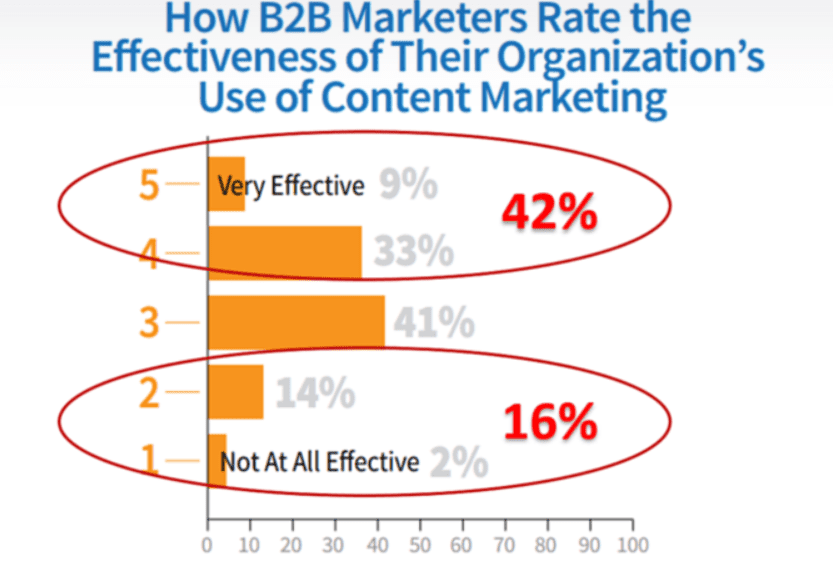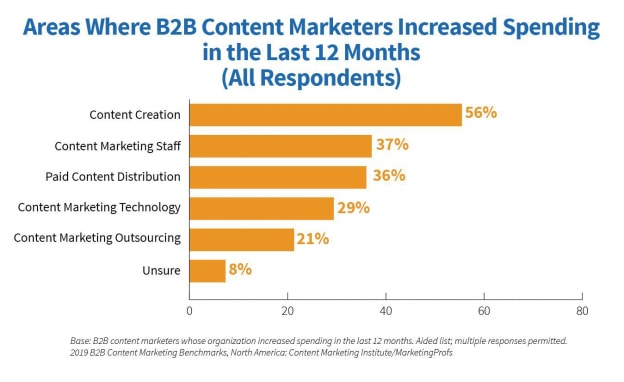by Venchito Tampon Jr | Last Updated on June 23, 2023
Startups are businesses in their early stages. They are usually growth-oriented and have a mission to build something innovative and new. Marketing for startups is very important because it helps them create awareness, generate leads, and grow their business.
Content marketing is a strategic marketing approach focused on creating and distributing valuable, relevant, and consistent content to attract and retain a clearly defined audience — and, ultimately, to drive profitable customer action.
Why is Content Marketing Important For Startups?
Content marketing is important for startups because it helps them in the following ways:
1. Creating awareness: Startups need to create awareness about their product or service. Content marketing can help them reach a larger audience and create brand awareness.
In fact, about 42% of marketers say that content marketing has increased their organic search traffic. What does this mean for businesses? More traffic to your website means more opportunities to generate leads and convert them into customers.

2. Generating leads: Startups need to generate leads to grow their business. Content marketing can help them attract more visitors to their website and convert them into leads.
In fact, content marketing generates 3 times as many leads as outbound marketing and costs 62% less. This means that businesses can save a lot of money by investing in content marketing.
By creating valuable content, startups can attract potential customers who are looking for what they have to offer.
About 80% of B2B marketers say that content marketing generates more leads than any other marketing initiative.
3. Growing their business: Startups need to grow their business. Content marketing can help them by providing valuable information that can be used to make decisions, solve problems, and take action.
Content marketing has been shown to increase sales and revenue for businesses. In fact, businesses that use content marketing see an average of 6 times more conversions than those that don’t.
This is because content marketing helps businesses build trust and credibility with their audience. When people trust a business, they are more likely to buy from them.
How to Get Started With Content Marketing For Startups
There are three stages to content marketing: Pre-launch, Early Stage and Scaling.
We’ll go into each stage in more detail below.
Pre-launch: In the pre-launch stage, startups need to focus on creating awareness and generating interest in their product or service.
To do this, they need to create high-quality content that is relevant to their target audience. This content can be in the form of blog posts, infographics, ebooks, or anything else that is valuable and informative.
Early Stage: In the early stage, startups need to focus on generating leads and growing their business.
To do this, they need to create content that is targeted towards their audience’s needs. This content can be in the form of case studies, webinars, or anything else that is valuable and informative.
Scaling: In the scaling stage, startups need to focus on tracking the growth of their business.
To do this, they need to create content that is focused on analytics and data. This content can be in the form of reports, infographics, or anything else that is valuable and informative.
Pre-Launch:
This is where b2b and b2c content marketers spend their budget in the last 12 months (2022).

As you can see, content marketing takes up the biggest chunk of the budget in content marketing. And it’s no surprise why: high-quality content is essential to success in the pre-launch stage.
This content can be in the form of case studies, webinars, or eBooks.
In order to start creating content, you will be needing tools to assist you. Here are some good recommendations from marketing experts:
WordPress: A content management system (CMS) that will help you easily create and manage your website’s content. For startups, this can be
Canva: A design tool that will help you easily create visuals for your website and social media accounts.
Hootsuite: A social media management tool that will help you easily schedule and publish content on social media
BuzzSumo: A content research tool that will help you easily find the most popular content on the web.
Contentful: A content management system (CMS) that will help you easily create, manage, and publish content on your website.
Once you have these tools ready, you can start creating high-quality content that is relevant to your target audience.
Early-Stage:
At this stage, it’s all about generating leads and growing your business. In order to do this, you need to create content that is targeted towards your audience’s needs.
Here are some ideas on how to create content for each stage of the buyer’s journey:
Awareness Stage:
- Helpful blog posts
- Informative infographics
- Engaging videos
- Problem-solving eBooks
Consideration Stage:
- Helpful guides
- Educational webinars
- insightful case studies
Decision Stage:
- Product demos
- Free trials
- Coupons and discounts
Blog posts: Blog posts are a great way to provide valuable information to your audience. They can be used to educate, entertain, or inspire your readers.
Videos: Videos are a great way to engage your audience. They can be used to show how your product or service works, or to tell a story about your brand.
Infographics: Infographics are a great way to visually communicate information. They can be used to explain complex concepts, or to showcase data in an easy-to-understand format.
Free trials: Free trials are a great way to let your audience try your product or service before they buy it. This can help you generate leads and conversions.
Repurposed content: Repurposing your content is a great way to get more mileage out of it. You can repurpose your blog posts into infographics, or your videos into blog posts.
Ebooks: Ebooks are a great way to provide valuable information to your audience. They can be used to educate, entertain, or inspire your readers.
Scaling:
At this stage, it’s all about tracking the growth of your business. You need to track your KPIs properly in order to make sure that your business is on track.
You will also need to use tools to help you track your KPIs effectively:
Google Analytics: A free tool that will help you track your website’s traffic and conversions.
KISSmetrics: A paid tool that will help you track your website’s traffic, conversions, and other key metrics.
Mixpanel: A paid tool that will help you track your mobile app’s key metrics.
Once you have these tools in place, you can start tracking your business’s growth and progress.
10 Examples of Successful Startups With Their Content Marketing Strategy
1. Airbnb
Airbnb is a startup that allows people to list, find, and rent vacation homes.
Airbnb’s content marketing strategy focuses on creating helpful and inspiring content for its target audience.
Some examples of their content include:
Blog posts about travel tips – AirBnb started a blog called “A travel guide by AirBnb” which provides helpful tips for its users.
Videos about people’s experiences – Airbnb has a YouTube channel called “Stories from Airbnb” which features videos about people’s experiences with the company.
The use of content marketing has helped AirBnb to become one of the most popular startups in the world.
2. Buffer
Buffer is a startup that provides a social media management platform for businesses and individuals.
Buffer’s content marketing strategy focuses on creating helpful and informative content for its target audience.
Some examples of their content include:
Blog posts about social media tips – Buffer has a blog called “The Science of Social Media” which provides helpful tips for its users.
Videos about the company and its products – Buffer has a YouTube channel called “Buffer Stories” which features videos about the company and its products.
3. Canva
Canva is a startup that provides an online platform for people to create visuals for their social media accounts.
Canva’s content marketing strategy focuses on creating helpful and inspiring content for its target audience.
Some examples of their content include:
Blog posts about design tips – Canva has a blog called “Design School” which provides helpful tips for its users.
Youtube Tutorials – Canva has a YouTube channel called “Canva Tutorials” which features helpful tutorials for its users.
4. WP-Engine
Considering that WP-Engine has huge competitors like Hubspot, WP-Engine has been working really hard in order to get their name out there. Their strategy is to partner up with other companies and publish content on their behalf. This way they are able to get in front of new audiences that they would have otherwise not reached.
5. Dropbox
When it comes to content marketing, one company that does it right is Dropbox. They focus on creating helpful content that educates their target audience on how to use their product.
How is Dropbox Marketing their Brand?
Since the company has grown to a large scale, they have been able to use their size in order to market their brand. They earn new leads through their referral program – for every new user that signs up, the current user gets rewarded with more storage space.
6. Scripted
Scripted is a startup that provides an online platform for businesses to find and hire freelance writers.
Scripted’s content marketing strategy focuses on improving their content, and they have been using podcasts, white papers, and webinars to generate new leads.
7. Salesforce
If you’re not familiar with Salesforce, they are a CRM software company. When it comes to Salesforce’s content marketing strategy, they focus on creating fun, yet informative content.
Salesforce has a blog called “The State of Marketing” which provides helpful tips and information for its readers.
They also created the first-ever stop-motion slideshare.
Lastly, they also display their customer’s success stories on their blog in order to show potential customers what they are capable of.
8. SAP
SAP’s mix of content marketing strategies include:
- Tweets
- Blogs posts
- LinkedIn status updates
- Posts on the SAP Community Network
- Radio ads
- Virtual events
- In-person events
- Outbound and responder follow-up calls
- Account Based Marketing
- Individual account meetings
According to Marketing Sherpa, their marketing strategy generated opportunities (MGO) equaled $3,675,000!
9. MobileMonkey
MobileMonkey is a startup that provides a platform for businesses to create chatbots for their social media accounts.
MobileMonkey creates a series of blog posts called MobileMonkey Growth Marketing Blog, where they write about topics such as:
- How to use chatbots for customer service
- How to use chatbots for lead generation
- What are the benefits of using chatbots?
This makes them one of the top companies to follow if you want to learn about chatbots and how to use them for your business.
10. Microsoft
Microsoft is a company that needs no introduction. They are a giant in the tech industry, and their content marketing strategy reflects that. They have a series of blogs called Microsoft On The Issues, where they write about topics such as:
- Cybersecurity
- The Future of Technology
- Artificial Intelligence
Microsoft is a company that is at the forefront of many new and emerging technologies, so their blog is a great resource for anyone who wants to stay up-to-date on the latest trends in the tech industry.
Frequently Asked Questions:
Is content marketing profitable?
Yes, content marketing can be very profitable for businesses. It can help them reach new audiences, generate leads, and even make sales.
Is content marketing in demand?
Yes, content marketing is definitely in demand. With the rise of digital marketing, more and more businesses are turning to content marketing in order to reach their target audiences.
How do you sell content marketing?
There are a few different ways that you can sell content marketing. One way is to offer it as a service to businesses. Another way is to create and sell products, such as e-books or online courses, that teach people how to do content marketing.
What is the content marketing cycle?
The content marketing cycle is the process that businesses go through in order to create and distribute content. It includes the following steps:
- Planning: This is where businesses decide what kind of content they want to create and why.
- Creating: This is the step where businesses actually create the content.
- Distributing: This is the step where businesses distribute the content to their target audience.
- Measuring: This is the step where businesses measure the results of their content marketing efforts.
- Adjusting: This is the step where businesses make changes to their content marketing strategy based on the results that they measured.
The content marketing cycle is an important part of any content marketing strategy, as it helps businesses to ensure that they are creating and distributing content that is effective and engaging for their target audience.
The Author
Venchito Tampon Jr
Venchito Tampon is a Filipino Motivational Speaker, Corporate Trainer, and a Leadership Speaker in the Philippines. He is the CEO and Co-Founder of SharpRocket, a link building agency. With a decade of experience, Venchito has a proven track record of leading hundreds of successful SEO (link builidng) campaigns across competitive industries like finance, B2B, legal, and SaaS. His expert advice as a link building expert has been featured in renowned publications such as Semrush, Ahrefs, Huffington Post and Forbes. He is also an international SEO spoken and has delivered talks in SEO Zraz, Asia Pacific Affiliate Summit in Singapore, and Search Marketing Summit in Sydney, Australia. Check out his other businesses, Hills & Valleys Cafe, Blend N Sips and Saas Pursuit.
How our LINK BUILDING AGENCY builds 250 links/mo consistently using Predictable Link Building Methodology™…
- Using a SIMPLE and PROVEN system
- Using a SCALABLE strategy
- No private blog networks
- No creepy outreach emails
